Essays on Sport
I do a lot of running, so it is not surprising I want to write about it. There is an element of selfishness to this, one which all whio run themselves will recognise. Your own story of a race is intense (to you) and you want to share it, even if others do not want to hear quite with the same intensity.
running essays include 17, 23, 32, 66, 77, 142, 188,
Hashing and hill-walking essays include 39, 62, 87, 101, 135, 192,
Allied sports health include 58, 63, 112, 124, 163, 188, 204,
Other sport; Rowing
I may have discovered why China does unrepresentatively (badly) at so many sports. This weekend is to be ‘Sports Day’. I have been asking repeatedly for information and, as ever in this so very frustrating country, have only partial answers.
Chronological order will preserve the story line but will not lead to an obvious conclusion. The answers to my questions led me steadily to believe I was being wound up. Those readers that know me well know already that my inclination is proactive when sport is concerned, and athletics in particular. My first question, predictably, is whether there is a staff team. Yes, I am told; not quite fo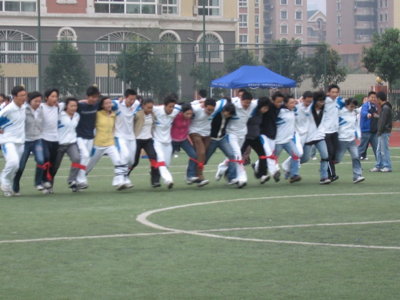 rgetting the useless nature of the affirmative here I ask if they are serious – apparently, yes. What events are included? Answers vary among the staff so I eventually ask the kids and the longest is 1500m, but the other answers suggest that there are many sprints. Since Sports Day is a pair of days, I am suspicious (after initial gross enthusiasm). When it is suggested that my ‘geography’ lesson with the pre-A-level group is used for games (a practice before Sports Day): I am again enthused.
rgetting the useless nature of the affirmative here I ask if they are serious – apparently, yes. What events are included? Answers vary among the staff so I eventually ask the kids and the longest is 1500m, but the other answers suggest that there are many sprints. Since Sports Day is a pair of days, I am suspicious (after initial gross enthusiasm). When it is suggested that my ‘geography’ lesson with the pre-A-level group is used for games (a practice before Sports Day): I am again enthused.
Silly me. I go home to change (no facilities for staff onsite) and at the appointed hour go to the track. I realise it is a 200m oval in tartan, not the 400 I have seen elsewhere in the school, presumably on a different campus. The kids form into squads for the expected haranguing from the sports staff, but they don’t do any warm-ups, they go into (dance) routines that are presumably for the opening ceremony. Now I see why there has been so much mention of that part of the day. Perhaps this will be all morning of the Saturday. I go away again, since I can’t use the track as they have spilled over on to it. I am fetched from my desk to take ‘some running’ and find I am given just the girls (while the boys apparently play soccer). The sports staff, so-called, have vanished. I ask the kids who is doing what on Sports Day and of the 12 girls four are doing something, no two the same. I explain to my very slight and junior colleague who set this up that this is not joining in and it means that Sports Day will be immensely boring for most people. I had rather assumed that everyone would be included. The mention of staff team suggests competition; how is any ‘team’ formed? Answer, apparently, that the kids choose to compete. I am not much the wiser. I had planned to work on starts, given the earlier comment that “the sprints go on forever”, but instead set up some shuttle runs, thinking that would at least include everybody. I am stopped within minutes because they must practise for some sort of multiple three-legged race. For Sports Day? The youngest person involved is 16, and we are to do events that belong in primary school? You are joking again. Apparently not. I say ‘apparently’ because I didn’t stay to find out. The staff events appear to be of the same infant party content and appear to be scrubbable if there is insufficient time.
I shall therefore be competing as the staff team against the children. If ‘staff team’ means competing against staff only in events I consider inane, they will not include me. I learned at Navy dinners that asking adults to play junior games only results in physical damage, often severe and expensive. The competitive spirit overcomes any sensible rationale.
I am bothered at the apparent lack of sport in the school. I am told that this is down to the Head and therefore I do not believe I have been told the truth as I would see it. What Head means in this place is another confusion; Principal principal? Assistant to the principled assistant? Much of the confusion is at the level of transliteration, much is fundamental cultural differences.
I will report on Sports Day as a sporting affair. At the moment, with two days to go, I am expecting the sort of wash-out where having rain would be an improvement. I shall make the most of it by turning up to events as I can. However, I still fail to see how this fills two days: if the sample answers were representative then less than a third of the kids will participate. The top year is not taking part at all, so maybe 200 participants of 1500 in the school. If events are separated by year and gender then there are to be perhaps 4x10 events, assuming some throwing and jumping occurs. If the opening ceremony took two hours there would still be eight hours left in the school day which is plenty of time for all that. So I wonder what else is planned? Maybe the ceremonies are competitive? If so, no-one has said, and the one English-speaking staff member has not helped me understand one whit. Perhaps he is laughing like a drain when my back is turned. So I understand not one wit and not one whit,
So far, my conclusion is that this country doesn’t understand competitive exercise at all. This explains how GB might finish in the top five in World athletics, ahead of countries with much bigger populations. I have a horrid feeling I might just be faster than most over significant distance. I can hope that I am wrong, that staff will join in, that the kids can run. I find no lists up around school sharing the programme, nothing indicating a choice of event, no training at all, not even a list or a poster advertising the thing. Very strange.
---------------------------------
Sports Day promised to be wet but the day dawned to dry pavements, so at 0740 we all turn up at school to find that it is ‘on’. The opening ceremony is not such; each of 24 classes does its keep-fit routine, all sixty taking part each time – which implies a school of 1500 with our lot, so more than I thought, even allowing that some students from the International Campus came to join in. These routines are all very similar, possibly fundamentally identical. The arrangement of people on the field varied but the exercises themselves looked very much the same. However, mass co-operation is the (one?) thing which Chinese do better than any Europeans. I would have loved to have the CCF contingent from Plymouth take part, just to show differences of approach. These are learned routines; they couldn’t do something very different at no notice as we in the CCF would expect to.
I find a printed programme by asking the pre-A level (PAL) students, who I discover sat in ordered rows at the bum end of the 100m straight. There is a six-foot width of low hedging keeping the track clear and the audience to just one side. There is little space between the far side of the track and the boundary fence, just enough for a narrow neat flower bed. The programme has apparently been in circulation all week, just not near me and with its existence in denial when I ask. My reading of numbers (and understanding of such events) is mistaken for reading of Chinese as I observe that there are heats and finals. The racing will begin with the 100m heats. Hardly a surprise: the time between races is depressingly large and the number of races brings on boredom fast (and brings out reading material among the crowd, sat on tiny folding stools). Each class yells encouragement at its own few participants, so the noise is pretty continuous. The school’s tannoy (T’ANNOY) plays martial music for two days, competing with an occasional announcer, who tells us results (sorry, not a clue) and updates us with corrections to the programme so that the printed thing is rapidly rendered useless. The weather gets steadily damper so that lunch, at 11:40, is a welcome relief. The 100m races demonstrate that these kids can sprint but have little idea about starts and I could beat all but two over the first 20m. The times are impressive, at low elevens.
Part two commences a little after 14:00 and there is shock that I want to participate, so I am ushered in to the second of the “Senior 1” [year 11] 800m races. Joseph and I share the outside lane at the start. Both of us are a little bothered by the 2:45 of the previous race. The boys set off too fast (as ever, but more so) and at the break, in the final straight on lap one of four, I find myself second from the back and going faster than I expected, but comfortable. Joseph is the one behind and, I learn later, the gap is growing. In the finish straight on the next lap, suddenly everyone slows and I shoot to third without a change of pace on my part. The lad in second dies on the next bend but tucks in behind me when I pass him and No1 is looking quite good as I chase him past the yelling crowd on the home straight of lap three. At the bell (600m done, a raised forefinger from the man in charge) the front guy suddenly slows and I almost clout him in trying not to run him over, not 15 metres into the last lap. I can feel him pushing hard to catch up, but it is all in the mind and the video shows me most of the straight clear in the pathetic time of 2:35. I used to do those in series of three or four at Shiplake and then beat 2:25 two minutes later. However, it is rated as worthy, the fastest of the day and suitably boggling for an OF-GIT (old fit guy-in-training).
The day became steadily wetter and wetter and at 17:30 we all went home. Much work was done sporadically in the office, while sharing the load of being seen outside.
Sunday was a little drier. One of the events in the morning was the staff stagger, where five of us (MFMFM) are tied together at the knees or ankles (there is a difference, but they don’t seem to care). So we picked the two girls up and ran. No, no we must do this again. So we do it properly and thus very slowly. Whether this is competitive cannot be told, since there is no communication on paper. I am getting loud again about planning, paper and honest answers. The others think this is funny, while agreeing with me. This event was programmed, even in the adjusted versions, for the afternoon, so we have arranged to practise at lunch. Wrong: it is fitted in before lunch, so we look stupid. Or stupider.
Some of the 200m heats were done in 27s and 29s; promising. This small track is not a problem unless you’re very quick and on the inside. I rather like it.
Similarly with the 800s for the Senior 2s. I didn’t think they’d happened on Saturday but my questions were yessed into irrelevance. I am caught and dragged to the start with 30 seconds notice, only saved because the starter takes so long to get going. These boys have more idea what is going on and there is a tight queue with me near the front for much of the race. They have all done it again and left nothing for later, so I do 2:34 or less and win again. The second race is an altogether different affair and I would have been third, since the winner did 2:29. By British standards, not at all good, but by Chinese ones, very good indeed. The school record is 2:25. Compare this with PMC at 1:58, or Shiplake, where I was doing 2:05 to 2:09 myself and only rarely finishing first.
The afternoon session will include some relays, the 1500s, the last of the 100s and the multi-legged thing, plus any leftover staff events. The answer to questions suggested that the relays would be first. At no notice I find I have a 1500m race, so I opt for the second one, with the bigger boys, feeling the need to warm up more important, and rather looking forward to those boys in the faster 800m having the chance to show that sir is extremely beatable. The first race was won in 5:20, which is faster than the 5:30 I am thinking I can do. With that time in mind I push hard at the start and find I am at the front with a tight line behind. At the end of the first half lap (1500m is 7½ laps), two go by me (so they must have changed speed due to the crowd’s noise) and the queue remains tight. Two finishes later (2.5 gone) another one goes by but I don’t think I have changed pace at all and am not yet blowing. At the next finish line, 4 to go, suddenly I am second and the guy in front looks good for a real race. The crowd’s yelling says that there are two really close on my heels, and one goes by at the tape, to be re-passed almost as soon as he could be; clearly performance is strongly affected by the yelling. Perhaps this is a ‘face’ thing? At 3 to go there’s just two of us left and at 2 to go I take him, still thinking he looks good for a fast finish. One to go and I’m blowing hard, but finish clear by the whole of the final straight – the red ribbon is put up after I have gone by. 5:10. Which remains the fastest of the weekend. The school record is 4:53 and he is (was) the only runner inside 5, ever. Again, compare with Shiplake’s record at 4:25 and me doing sub-fives often (at 40), or PMC’s record at under 4:05 (and myself sub-5 less often but running more races in the day, typically eight).
The multi-legged thing requires most of the class to be bound together, typically twenty of them and they run maybe 50 metres chanting yi-er (except that wasn’t what I heard at all) to throw themselves onto the high jump mats. Which might explain the lack of high jump all weekend. Since there are 24 classes, this takes forever. The delay is in the time it takes to undo the straps. The other field event (beside the long-jump) was just a small medicine ball to throw two-handed like a soccer throw-in. I can throw it twice as far one-handed like a shot, or further still by facing the other way. But not like that.
Silly staff relay follows: 4x50. We, MFFM, come a clear second to the 4 male games staff, but make much joss by beating all the academic teacher teams. Similarly, in the seated rowing (teams of five, same sex: feet over the shoulders of and into the lap of the guy in front, propelled by hands on the ground; 40-50m across the plastic grass soccer pitch towards the crowd) the two teams leading us at half way fell apart and we won it (Lee, Joseph, me and two junior PE staff); I think both male and female teams had to cross the line and our women were next behind us. Again, great for business.
And not a parent in sight. The whole affair finished at about 17:30 and the road outside school was reduced to half a lane by the extra (parked, stopped, in the way) presence. Lots of grim-faced parents out there. Not a good message to send and I shall ask questions. No doubt they will be also yessed into insignificance but the seed will be sown and maybe, just maybe, someone can be persuaded to rethink their attitude. The kids had a good time: morale was high. The collective spirit was to hold the event, whatever the weather.
On the other hand, the only valued position was first. Being first across the line in any one lap was almost as good; being first at some point in the race was a clear measure of success. Large numbers of children, particularly the girls, would collapse at the line, 3 out of six was not unusual and quite un-called for. Maybe this is part of the face-saving performance. Collapsing during the 800 or the 1500 was a good let-out. The boys in my races were in a dreadful state at the finish, quite unrepresentative of their efforts during the race. It is as if they do no training at all and the body has no idea what to do at the end of the exercise. There were several kids, especially among the girls, where I could improve their times by 20% in three weeks, just by practice (not even training, just practice). Many could take 20 seconds of their 800m time by running at an even pace; most would benefit from regular exercise, and you could tell the serious runner – it had a pair of shorts. One girl (only) ran in long shorts – and hers were the only spikes I saw all weekend. I saw no spikes on the boys and their shorts are so long they hardly help. Yet their 100m times were impressive. I found out why: I was surprised at a 10.2 and went to point it out with delight to one of the staff. The 100m was run over only 85m. Which means even this OFGIT would have won most of the sprints, since I must still be at around 14 seconds for the 100m, so around 11.4 for 85. Scary.
I joined in; our unit joined in. Politically this was a very good thing to do. All three of the vice-principals outside our unit have now sat with us at lunch (a singular honour), doing so this week (the one after the event) on separate occasions and so making the point more visible. Winning the last two events was an excellent thing to manage. The prospect of bringing a British group of kids to compete is almost frightening. A tour group would need to be quite non-sporty to not shine. Remembering that China is twenty times more numerous the Britain one has to wonder what they do while we are lounging in front of the tv. Work, of course, and then more work. The resident teachers’ response, it is predicted, to the suggestion that parents might like to come and observe or even join in, will be that they—the parents—are all at work and the only thing they want to know is that school will finish as usual, at 1700 on a Sunday.
They have a lot of life missing.
DJS 20071025
A year later, in a different city, I have a similar experience. In Nanjing, the school, although possessing a wonderful new athletics track, goes to the “Olympic Stadium” far away on the other side of the city, because the 3000 pupils "need a bigger space". They don’t really, if the idea is to do sport. They do if the idea is that all will attend and if the high point of the day is the parade.
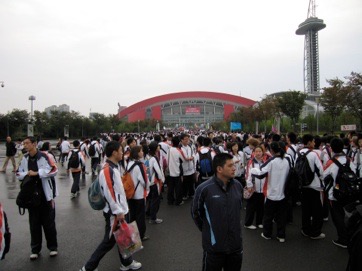
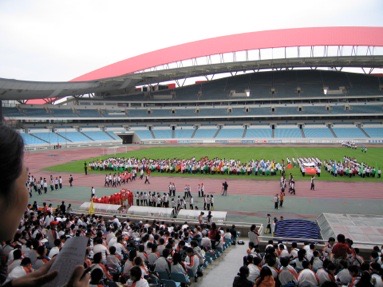
A Saturday, of course. All day, of course. Like Xi’an, the important part is the parade, so the school forms up on the very grand sweep of pedestrian road up to the stadium – maybe 3000 students, collecting around flags that represent their part of the school. This parade wends its crocodilian way (collecting at 0700 or so, so I set off from my flat at 0630) into the stadium and by around 0800 the kids are in the stadium. At which point the opening ceremony begins. All the athletes (or their stand-ins) are on one side of the central field and some fewer reps are on the near side, where the school is entirely lost in a stadium seating something like 60,000. The ceremony is grand, featuring the five Olympic figures, two dragons, and at least one school club, the karate club.
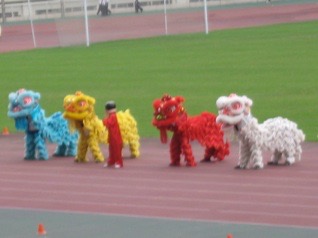
By now I have met my Canadian equivalents. All the staff of that section have turned out (a three line whip, maybe). By 0830 they have disappeared. Two of ‘my’ staff appear for much of the mid-morning, having met in town at a civilised 0930 and two more appear later in the day, after lunch and around tea-time.
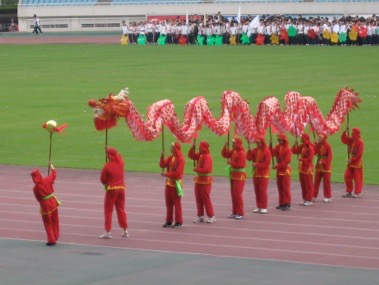
Eventually we get to the athletics. The crowd takes little notice of anything. There is a tannoy system blaring incomprehensible mandarin and ‘everything is turned on’ but the big screens are not. Apparently the timing is done by some invisible electronics (entirely invisible; the finish line is empty of instruments and of people). The kids take almost no notice at all, being fixated on breakfast, then more food, then whatever they have brought to read or write (possibly homework, but I am the one with marking to do).
This track is a 400m circuit. The 100m events look desultory, although the times I attempt to record look much better – 11.8 was not untypical for the boys. Events seem to be separated by age and by school section, so the “international” programmes (all are Chinese) are racing each other. All wear the same gear, so are indistinguishable, so that really helps group support. Not.
The 100m is followed by some 400m, boys only, then some smaller boys’ 1000m, eventually some 200m and at last some girls’ 800m and boys’ 1500m. I completely lost track of time, being supplied with food and drink at irregular intervals and trying to convert staff interest into participation. Trackside, there was some jumping and ball throwing as described above, but not at all visible as it was on the far side of the track and access was not available within the stands. I tried, at length.
Lunchtime included a soccer match, which I should have kept well away from, as I was point-fully hit with elbow in ribs (still suffering the consequences three weeks later), obviously ill-equipped for a full-pitch game and, for me, relatively slow. Staff team soundly beaten 4:1 despite replacing five players after 20 minutes (half-time). It would have been more even if we’d played for 70-90 minutes, but the staff were uniformly too slow and in need of better teamwork – just an assumption of someone in position in (any) space would have been enough.
Staff events continued with a 10x50m shuttle relay. Four staff teams of at least ten and maybe 16 raced back and forth along a 50m stretch of the main track, producing a win by about a metre from a lead that had been at least 20m at one point. Very good fun and a good spectacle.
A staff team joined in a 4x100 relay, since there were several lanes not in use. We came comfortably last, and I must not do sprinting without serious warm-up and rehearsal as all sorts of things felt close to snapping. Some nasty pull in the upper leg left me worrying about later racing and about next month’s Xi’an race.
One other race, very close to the end, was the “staff 1500m”. Fortunately, this was combined with one of the student races and was probably the second or third last race of the day. I had run off the bulk of the soreness by doing slow laps of what I will call the undercroft of the track, probably 500m of roadway under the stands and where kids galore were occupying themselves at all sorts of things unrelated to the activity inside the stadium. By then, close to 1700, the numbers have visibly declined.
The line-up for this staff race was impressive, maybe ten staff and at least eight boys for their concurrent race. At the start, the boys all rush to the front in the expected style and two staff do similarly. The staff fall clearly into two groups, elderly & fit or youthful & optimistic. I pass a small fit-looking man on the first straight and get on with chasing the boys. With one lap done one of the boys is not accepting that I will go past him and he is matching me for speed and stride. Somewhere just after where we started but on lap two we lap one of the older staff. By the start of the fourth lap he has had enough (and stops) and I am definitely regretting the soccer and the sprinting as all sorts of things are complaining. I fail to catch the front runner, by maybe 10 or 15m, but he has at least been scared into a sprint finish. I suspect I have lapped all but one of the staff, and two have been lapped twice, so that when they finish I have already run another 3/4 lap back (the ‘wrong’ way) to my gear and dressed. Oops. The time, on my wrist and shown to me by a new colleague at the start position was 5:17, which I agreed with him was “bu hao” (boo how, not good). Really: I should be doing 5:05 or less on the current training regime, so the sprinting really did some damage. Sorry for the selfish report; see Short-term Objectives, resulting from what was observed on the track this day.
See also the extension to the Wall Race, assuming there is one to write – the race is the day after tomorrow.
DJS 20081030
related tales: 54 Short-term Targets, 17 City Wall Race
small edits 20100824